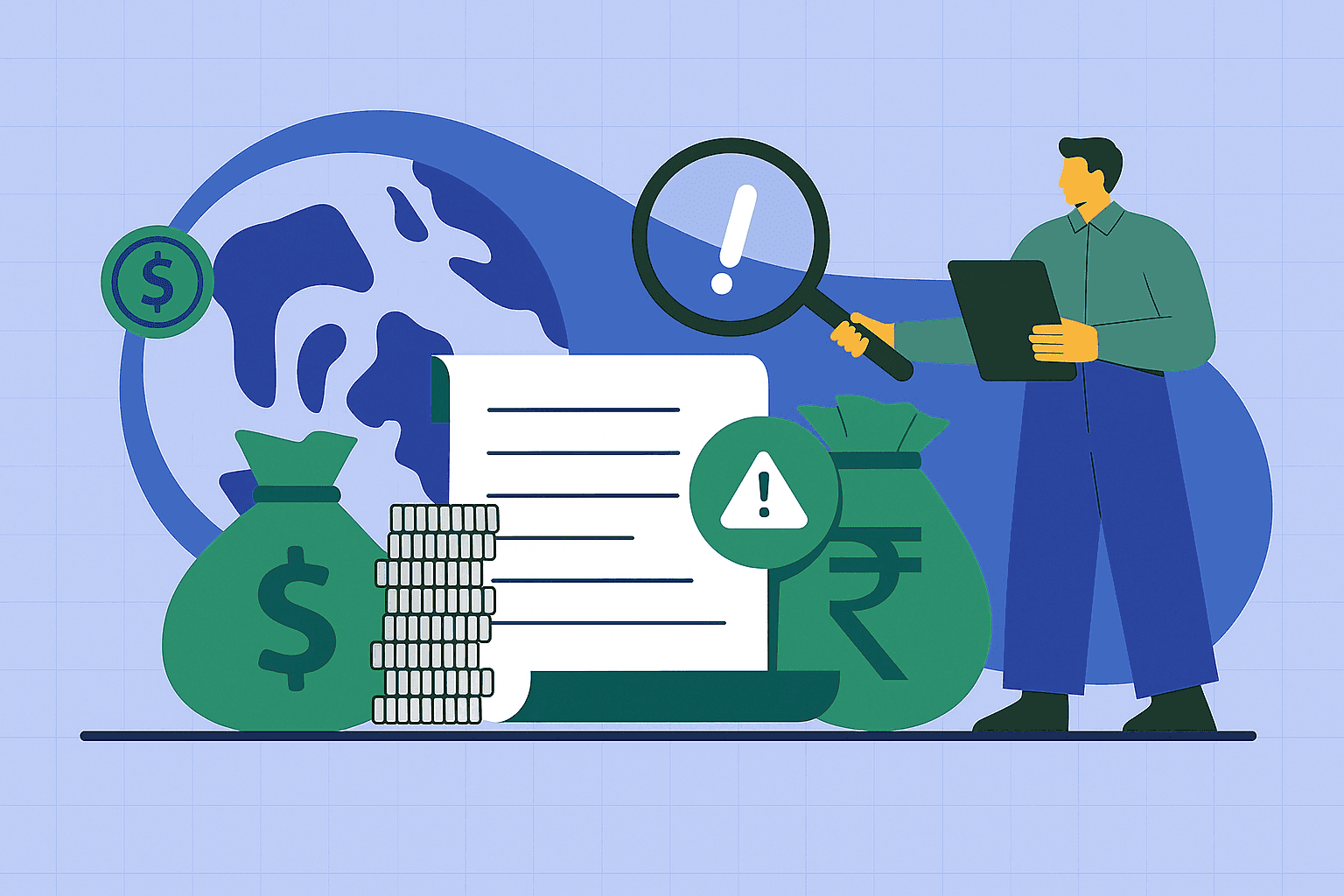AI in Compliance: How Skydo Keeps Cross-Border Money Clean (and Fast)

Cross-border collaboration is now everyday business. A design team in Berlin works with a marketing agency in Bengaluru, a US SaaS company pays support teams in Manila, and enterprises run truly global vendor and partner networks. However, they also expose firms to fraud, money laundering and complex regulatory risks. Legacy compliance systems (manual reviews, static rules, rigid blacklists) struggle to cope, and traditional fraud detection can become “too slow”, “too rigid”, and “too costly”.
For example, by the time an irregular payment is flagged under old processes, fraudsters may have long moved the money. In today’s fast-moving market, enterprises need smarter, faster compliance – and that’s where AI in compliance comes in. In fact, 68% of financial services firms now list AI-driven compliance and risk management as a top priorityaiprise.com. By continuously learning payment patterns and regulatory changes, AI can identify suspicious activity before damage occurs, rather than reacting after the fact
Enter AI: Transforming Fraud Detection
AI shifts fraud detection from a reactive to a proactive, contextual model. Instead of relying on fixed thresholds or historical blacklists, modern AI systems learn live transaction patterns and “contextualise behaviour” For instance, suppose an Indian exporter usually receives $10,000 a month but suddenly gets $200,000 from a new client. AI-led compliance can flag this anomaly and then automatically analyse the details – checking past payment history, industry norms, and the sender’s profile, rather than outright blocking the transfer. In practice, the system might verify questions like: Has this exporter ever seen such a payment before? Is this amount typical for their industry? Does the payer have a solid history in similar transactions? If anything seems off, AI immediately escalates the case for review. This contextual monitoring greatly reduces blind spots that static rules miss.
Key AI-driven features include:
- Adaptive learning: AI continuously updates its fraud models from new transaction data, avoiding the rigidity of fixed rules
- Contextual anomaly detection: Unusual payments are evaluated in real time against historical trends, geographic risk factors, and other contexts. AI might ask, for example, “Is the sender in a high-risk country? Is this payment consistent with past behaviour?
- Real-time identity checks: AI augments KYC by cross-referencing data against government registries and even biometric sources. Modern systems can match customer names, dates of birth, and faces across databases to catch sophisticated fraud (e.g. deepfakes or identity swaps)
- Continuous monitoring: Even after onboarding, every transaction is scored on risk. AI filters out false positives by assigning nuanced risk scores instead of instantly blocking payments. This lets compliance teams focus on real threats, not harmless anomalies.
Together, these capabilities turn AI into a “predictive firewall” for payments. Fraud is detected before it materialises, false alarms are minimised, and compliance becomes a real-time process rather than a paperwork chase. Importantly, AI doesn’t replace human judgment – it enables teams to work faster and smarter. As Skydo’s experts put it, AI is a “co-pilot” that flags genuine risks while letting human officers concentrate on high-risk cases
Skydo’s Virtual Account Platform
Skydo applies these AI capabilities within a modern cross-border payments platform built for exporters. Instead of standard SWIFT wires, Skydo provides virtual multi-currency accounts. When a business signs up, it instantly receives local bank accounts in major currencies (USD, EUR, CAD, SGD, etc.)
From the payer’s view, they simply wire money as if sending a domestic transfer to a familiar bank in their country. For example, U.S. clients pay into a Skydo USD account at a real U.S. bank (Community Federal Savings Bank in New York), European clients use a local IBAN at Barclays, and so on. Behind the scenes, Skydo collects the funds, converts at the real-time mid-market rate, and settles the exporter’s INR account, providing the necessary FIRA/GST paperwork for RBI compliance on the receipt.
- Multi-currency virtual accounts: Every exporter gets local USD, EUR, GBP, CAD, SGD (and more) bank accounts instantly. No need for complex SWIFT instructions.
- Global bank partners: Each virtual account is a real regulated bank account. Skydo partners with trusted banks worldwide (e.g. Banking Circle in Europe, DBS in Singapore, Community Federal in the U.S., Barclays in the U.K.). Funds flow through familiar banking rails, not crypto or shadow channels.
- Regulatory compliance (FIRA/GST): Payers’ wires to Skydo accounts are treated as local transfers. Skydo’s system automatically issues Indian export receipts (FIRA) so the exporter has full GST compliance without extra effort.
- Fast settlements: Because these transfers bypass multi-bank SWIFT chains, funds usually clear within 24–48 hours. In practice, exporters get their money as if it were a quick ACH transfer – but with official foreign-remittance documentation.
In short, Skydo’s platform makes receiving cross-border payments as easy as domestic transfers, but with full audit trails for regulators.
AI-Driven AML/KYC at Skydo
Under the hood, Skydo builds strict compliance right into its platform and adds AI on top. The system is ISO 27001 certified and SOC 2 compliant, meaning it meets top industry standards for data protection and system reliability.
All payment data is encrypted (at rest and in transit), two-factor authentication is enforced, and 24/7 monitoring detects unusual activity. Skydo is also RBI-authorised (Payment Aggregator – Cross Border), so it must follow rigorous audit and anti-fraud rules just like PayPal or Wise. In practice, this means thousands of compliance and security checks have been built into the platform’s DNA.
Importantly, Skydo’s AI doesn’t operate in a vacuum. It works hand-in-hand with humans. When AI identifies a red flag, compliance staff step in to review the case – but routine alerts are triaged by machine. This hybrid approach minimises false positives and speeds up legitimate payments. As noted above, rather than blocking every match on a sanction list, Skydo’s AI assigns a risk score and only pauses truly high-risk flows.
Compliance teams can then focus on verifying these real threats, while low-risk transactions sail through. In effect, AI is a compliance copilot – streamlining document checks, sanction screenings, and ongoing monitoring – so the “compliance teams can focus on high-risk cases while AI handles routine screening”
Speed, Transparency and Savings
The combination of AI compliance and streamlined rails also makes Skydo’s service remarkably fast and cost-effective. Since Skydo uses local transfers instead of chained wires, payments often settle within a day or two (versus several days for SWIFT). Exporters from India benefit from flat, low fees: Skydo charges a fixed fee (e.g. $19 for payments up to $2,000, $29 up to $10,000) and promises zero hidden markup. By avoiding SWIFT fees and FX spreads, businesses typically cut costs by ~50% compared to banks. And every transaction is fully transparent – the receiver can track the payment end-to-end in real time, eliminating uncertainty.
In practice, this means companies save on fees and get their cash sooner. There are no surprise charges: you pay the invoice amount plus one flat fee, and you receive the full agreed foreign currency (since Skydo never skims an extra margin on the FX rate). This financial efficiency, combined with AI-backed security, lets businesses send or receive cross-border payments “as safe as any major bank transfer", but without the typical delays and costs.
Balancing AI and Human Oversight
AI in compliance is powerful, but it’s not a magic bullet – Skydo’s approach recognises that. Every AI-generated alert or decision in the system is backed by traceable logic and human review. The platform logs detailed decision trails for each transaction, so auditors can always answer “why” a payment was approved or flagged. And models are regularly updated and tested. The engineering team uses AI even to bolster security (generating test cases, simulating attacks, etc.), but compliance officers remain the final arbiter of high-risk cases. In short, Skydo’s motto is “compliance by design”; security and regulatory checks are built into every service layer from day one.
By taking this holistic approach, Skydo demonstrates that AI in compliance can keep cross-border money both clean and fast. Machine learning stops fraudsters and speeds approvals without adding extra paperwork for legitimate users. Meanwhile, certifications (ISO, SOC2, RBI licensing) and real bank partnerships ensure the system is trustworthy and fully auditable. Today, Skydo serves over 30,000 Indian exporters and handles hundreds of millions of dollars in cross-border flows. For enterprises expanding internationally, Skydo’s AI-powered solution shows how advanced technology and smart processes can turn a compliance headache into a competitive advantage – keeping global payments secure, streamlined, and swift.
What does “AI in compliance” mean in cross-border payments?
AI in compliance refers to using machine learning and automation to monitor transactions, verify customers (KYC), and detect suspicious patterns in real time. Instead of relying only on manual checks and static rules, AI continuously learns from data to spot potential money laundering, fraud, or sanctions risks before they become a problem.
How does AI help with AML and KYC for international transactions?
How does Skydo use AI in compliance for cross-border payments?
Can AI in compliance reduce payment delays for enterprises?
Is AI-based compliance enough on its own, or do humans still review cases?












